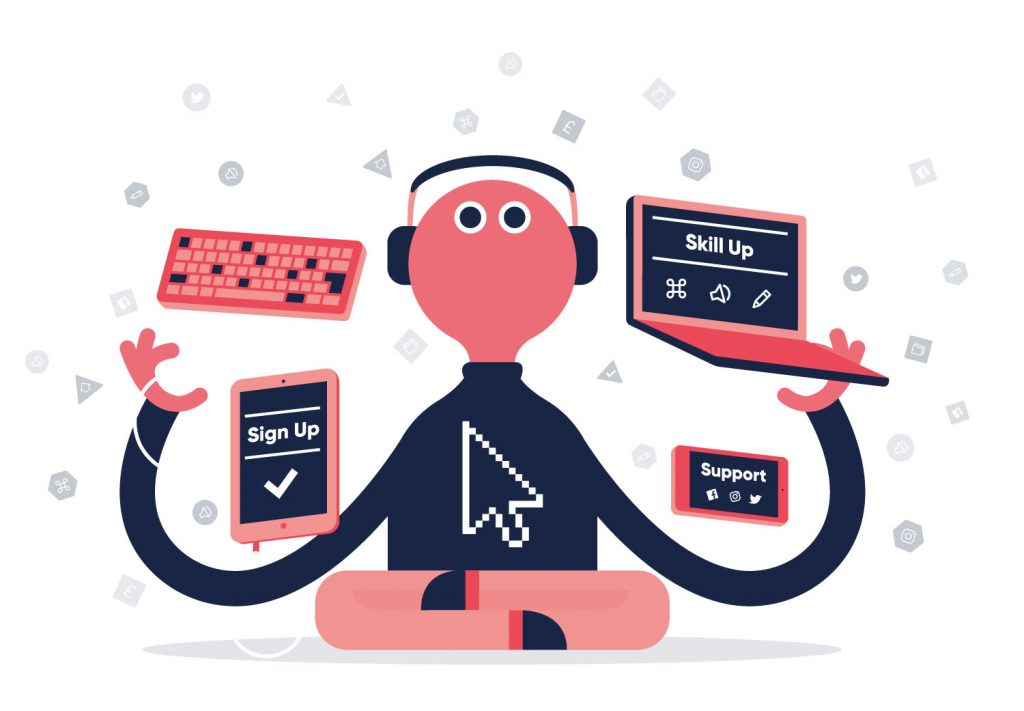The Essential Digital Skills Toolkit - a digital journey
Last month, visitors to this site may have enjoyed a blog about the journey SCVO has been on to create a digitally confident third sector in Scotland by my colleague and Head of Digital, Sally Dyson.
As a Digital Participation Officer, a large part of my role is to support organisations on their digital inclusion journey and to improve the Essential Digital Skills (EDS) of their workforce, volunteers and/or service users.
The Essential Digital Skills Framework, launched in May 2018 and, currently hosted by the Department of Education, gives people a clear description of the digital skills we all need in our day to day lives. This is made up of five sections: communicating, transacting, problem solving, handling information and content and being safe and legal online. The framework is designed to help us all use the same language when thinking about digital and how to tackle digital inclusion in the UK.
For us at SCVO, the framework is key to the work we do and underpins our Essential Digital Skills Toolkit, which is the first of its’ kind in Scotland and was created to help people make practical use of the Framework. It’s designed to be used, modified and adapted to fit users’ needs and is freely available via the digital participation section of our website.
Although the main focus of the Toolkit are the Foundation and Essential Digital Skills Checklists and how to use and adapt them to meet users’ needs, the Toolkit also contains key information and statistics around the landscape of digital inclusion in Scotland and signposts to relevant reports, resources and learning aids.
The Foundation skills checklist consists of five short statements such as ‘I can connect my device to WiFi’ and is designed for people right at the start of their digital journey. If people check ‘I can’t do this’ next to any of the statements, they are directed to resources to improve their skills. If they have all the Foundation skills, they are directed on to the EDS checklist.
The EDS Checklist should take less than ten minutes to complete and can be done online or printed off and completed in a paper format. No personal data is stored, so we advise organisations who would like to record data to build it in to an online survey and offer support if they need it to do this.
It is split into ‘Life’ and ‘Workforce’ skills and then into sections, as per the Framework. Each section contains statements relating to the sections and asks participants if they can or can’t complete the tasks stated, with additional options for ‘I would like to learn how to do this’ or ‘this is not relevant to my job role’.
In the online version, results are displayed in the form of an outcome star and direct the user to resources relating to the areas the user may be less confident in. We also provide guidance on other ways to display the results if organisations are keen to make their own version.
When developing the Toolkit, we felt it was crucial to involve the people who were (hopefully!) going to be using it. We ran a consultation event in July 2018 and asked attendees to share their thoughts on the initial version.
The event generated a lot of great discussion and suggestions about what they liked and thought needed improving. This was instrumental in the creation of the Foundation Digital Skills Checklist, as many of the organisations said the service users’ they support would be at foundation level, if not lower.

Since the launch, the feedback on the Toolkit has been positive overall, and we have been delighted with the number of organisations who have used it as part of their own digital inclusion projects.
As an example, Dundee City Council and Streetwork at Simon Community have both developed their own versions for use which allow them to measure the essential digital skills necessary for work in their staff and the essential digital skills of homeless service users that are necessary in everyday life.
As the Toolkit approached its’ first birthday, we decided it would be a good idea to revisit and revamp it, and again asked for help from people in the sector via a Toolkit: One Year On’ event. Here, we received invaluable feedback which will directly shape how the new version will look.
In particular, we are keen to improve the measurement scale, how the results are displayed and adjust the response options to allow individuals to choose multiple answers such as ‘I can’t do this’ and ‘I want to learn how to do this’.
Additionally, we are looking at how to provide better advice and guidance to organisations who want to use the Checklists in their own projects who may be new to digital, for example, how to create bespoke versions best suited to their own aims and values.
We hope to have the new version ready and updated by early 2020. Keep an eye on Twitter and our website for more updates.
If you or your organisation are already using the Toolkit, we’d love for you to get in touch and give us your feedback. If you’d like to use it, but aren’t sure where to start, you can contact me at claire.sharp@scvo.scot.



